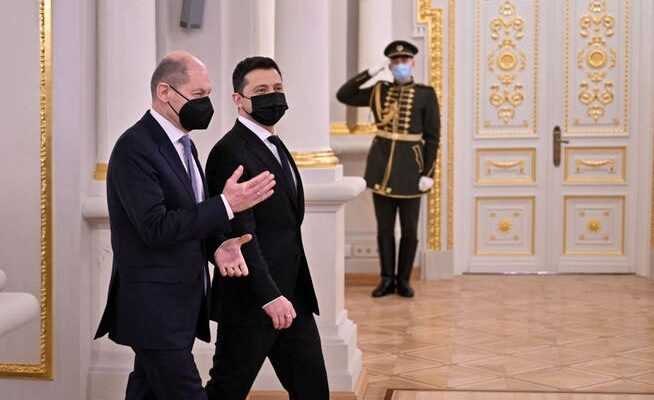The German chancellor calls on Russia to de-escalate and sides with Kiev. He doesn’t give Ukraine any illusions.
Ukrainian President Volodymyr Zelensky receives German Chancellor Olaf Scholz in Kiev’s Marienpalast.
Ukraine is at the center of world attention, but it’s not really to their benefit. The drastic warnings of the Americans and their partners of an imminent attack by Russia and the urgent appeal of many governments around the world for their citizens to leave Ukraine quickly met with little approval in Kiev. Many feel they are being played with – too little active support from the West, and being taken in by a threatening military force in Russia’s tongs.
Small success in the Minsk peace process?
The Ukrainian President Volodymyr Zelensky did not hide this at the press conference with the German Chancellor Olaf Scholz. He described the decision by numerous diplomatic missions to withdraw staff and temporarily relocate their headquarters to Lviv in western Ukraine as a mistake. An attack on Ukraine would affect the whole country. “Whoever stays is with us” – this message also applied to members of parliament and business people who had apparently left to be on the safe side.
The trip was doubly difficult for Scholz: In view of the increased fear of war, there are high expectations for his visits to Kiev and Moscow, as Berlin is also of central importance for the Donbass because of its role as mediator in the Minsk peace process. At the same time, Ukrainian politicians did not hide their frustration at Germany’s refusal to supply arms. Scholz tried to counter this dissatisfaction by emphasizing Germany’s financial aid: no other country in the world has supported Ukraine with so much money in recent years; keep it that way. He did not address problems such as corruption.
Above all, the German chancellor seems to see Zelensky’s commitment as a concrete success and contribution to the implementation of the Minsk Agreement: The Ukrainian government wants to present draft laws for the special status of the parts of the Donbass that are not under its control and for the holding of local elections. This should show that there are no pretexts for continuing the talks on the implementation of “Minsk”, emphasized Scholz.
Like French President Emmanuel Macron, he seems to see this as a key to de-escalation. Selenski did not comment explicitly on this. He only reiterated his hope that negotiations would continue. The topic is very sensitive domestically.
Warning to Russia
Scholz’ travel diplomacy serves to persuade Russia to de-escalate – by showing a willingness to engage in dialogue and by issuing an unmistakable warning. The Chancellor repeated the same message several times: together with its Western partners, Berlin will not allow any further violation of Ukraine’s territorial integrity. A comprehensive package of sanctions with far-reaching consequences for Russia is available at any time. But he didn’t want to say more about it. There are no reasonable explanations for Russia’s military activities on the border; they caused great concern. Scholz thanked Selenski for the level-headed, reserved reaction to it.
But the German chancellor was also almost brutally honest: the question of Ukraine’s NATO membership isn’t even on the agenda, so Russia’s behavior is all the more incomprehensible. He added that of course the right to freely choose an alliance is not up for discussion. Selenski was under no illusions and believed that NATO membership naturally depended on other states. But that this wish is unshakeable, he emphasized when he had to comment on ambiguous statements by the Ukrainian ambassador and temporary foreign minister Vadim Pristaiko. This was understood to mean that Ukraine would be prepared to withdraw its NATO membership request.
Most importantly, Zelensky said that without security for Ukraine, there can be no security for Europe and it is very important that the country’s defense capability is now strengthened. A new security order for Europe can only exist if Ukraine is included; this is an outpost of democracy. Scholz’ realistic assessment from a German point of view must therefore have felt like a cold shower to Selenski. The Ukrainian president has to appear strong, courageous and brave – and yet always comes across as a supplicant.
Russia wants to keep talking
The Kremlin seemed to want to set a demonstrative counterpoint to the looming threat of war. President Vladimir Putin received Foreign Minister Sergei Lavrov and Defense Minister Sergei Shoigu. The former said that while the US and NATO had responded unsatisfactorily to Russia’s proposals for security guarantees, talks were being held. “Is there a chance that we can come to an agreement?” Putin asked. “There’s always a chance,” Lavrov replied. For the time being, he advises continuing and intensifying the talks. Putin agreed. Shoigu, on the other hand, reported that the big maneuvers, also together with Belarus, were coming to an end.
